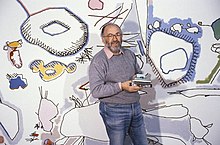Harold Cohen (artist)
Harold Cohen | |
|---|---|
 Cohen in 1979 | |
| Born | May 1, 1928 London, UK |
| Died | April 27, 2016 (aged 87) |
| Occupation | artist |
| Organization | University of California, San Diego |
| Known for | AARON |
Harold Cohen (1 May 1928 – 27 April 2016)[1] was a British-born artist who was noted as the creator of AARON,[2] a computer program designed to produce paintings and drawings autonomously, which set it apart from previous programs.[3] His work in the intersection of computer artificial intelligence and painting lead to exhibitions at many museums, including the Tate Gallery in London.[4]
Early life
[edit]Cohen was born in London, the son of Polish-Russian Jewish parents, and was educated there at the Slade School of Fine Art.[5]
Career
[edit]Cohen represented Great Britain at the Venice Biennial in 1966.[6] Cohen moved to the United States as a visiting lecturer at the University of California, San Diego in 1968. He was later given the rank of professor and stayed at UC San Diego for nearly three decades; part of the time as chairman of the Visual Arts Department.
In addition, he served as director of the Center for Research in Computing and the Arts at UC San Diego from 1992 to 1998.
Cohen taught at UC San Diego from 1968 to 1994.[7] After his retirement from UCSD, he continued to work on AARON and produce new artwork in his studio in Encinitas, California.
In 2014, Cohen received the ACM SIGGRAPH Distinguished Artist Award for Lifetime Achievement award.[8]
Early in 2016, Cohen started a new project with AARON called Fingerpainting for the 21st Century. In this project, Cohen used a touch screen to digitally colour and finish artworks. In previous AARON projects, images would be outputted in physical form before Cohen made alterations.[9]
Family life
[edit]His partner was the prominent Japanese poet Hiromi Itō.[10][11]
AARON
[edit]Cohen's work on AARON began in 1968 at the University of California, San Diego.[12] He initially wrote AARON in the C programming language but eventually converted to Lisp, citing that C was "too inflexible, too inexpressive, to deal with something as conceptually complex as color."[13]
References
[edit]- ^ Obituary tribute Harold Cohen
- ^ HÉDER, Mihály. AARON. In: Frana, P L; Klein, M J (Eds.) Encyclopedia of Artificial Intelligence: The Past, Present, and Future of AI. Santa Barbara (CA), USA: ABC-CLIO (2021) 378 p. pp. 1-2.
- ^ Todorovic, Milos (2024). "AI and Heritage: A Discussion on Rethinking Heritage in a Digital World". International Journal of Cultural and Social Studies. 10 (1): 5. doi:10.46442/intjcss.1397403. Retrieved 4 July 2024.
- ^ "Profile on webpage about AARON". Archived from the original on 20 May 2018. Retrieved 28 May 2017.
- ^ "Harold Cohen, artist – obituary". Telegraph.co.uk. Retrieved 12 May 2016.
- ^ "Center for Human Imagination". imagination.ucsd.edu. Archived from the original on 15 January 2022. Retrieved 15 January 2022.
- ^ "UC San Diego Visual Arts Exhibition Honors Art and Computing Pioneer Harold Cohen". ucsdnews.ucsd.edu. Retrieved 15 January 2022.
- ^ Archived at Ghostarchive and the Wayback Machine: ACM SIGGRAPH Awards - Harold Cohen, Distinguished Artist Award for Lifetime Achievement. YouTube.
- ^ "Archived copy" (PDF). Archived from the original (PDF) on 17 January 2018. Retrieved 16 January 2018.
{{cite web}}: CS1 maint: archived copy as title (link) - ^ Sundararajan, Louise (9 August 2021). "Harold Cohen and AARON: Collaborations in the Last Six Years (2010–2016) of a Creative Life". direct.mit.edu. Retrieved 31 December 2022.
- ^ "WMU News - Well-known Japanese writer, poet visits campus". wmich.edu. Retrieved 31 December 2022.
- ^ Cohen, Harold. "Toward Diaper-Free Autonomy". aaronshome.com. Archived from the original on 1 July 2015. Retrieved 29 June 2015.
- ^ Cohen, Harold. ""A Sorcerer's Apprentice" Talk at the Tate Modern". aaronshome.com. Archived from the original on 1 July 2015. Retrieved 29 June 2015.
External links
[edit]- 35 artworks by or after Harold Cohen at the Art UK site
- Official website
- Harold Cohen at Victoria and Albert Museum
